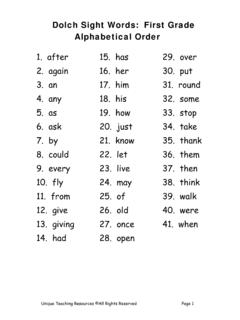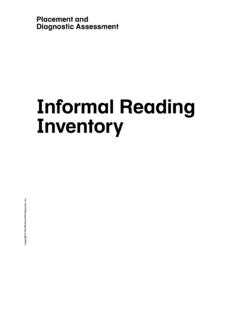Transcription of HIGH FREQUENCY WORDS (ARE NOT SIGHT WORDS!)
1 HIGH FREQUENCY WORDS (ARE NOT SIGHT WORDS !) High FREQUENCY WORDS are the most common WORDS in our language; they are essential WORDS as they are needed to make up even the simplest of sentences. High FREQUENCY word lists are composed of WORDS that can be decoded (phonics) and a few that that have been termed as SIGHT WORDS because they contain more complex spellings which are not phonically decodable. For that reason, it is important that we help students learn the tricky or complex parts of the WORDS .
2 One of the problems with is that schools tend to confuse High FREQUENCY with SIGHT WORDS . Schools still use the 100- 300 High FREQUENCY wordlists to test for reading and spelling; teachers test all their class and then send these WORDS home to be learned by SIGHT and therefore many dyslexic children spend years failing to learn and retain them. We tend to think that there are so many irregular WORDS however, only 4% of WORDS are truly irregular and may be learned mainly by SIGHT . * There are a number of High FREQUENCY Word lists that have been produced over time, for example: dolch , Oxford, Magic and Fry Wordlists.
3 * IDA fact sheet Louisa Cook Moats, WHY IS IT SO IMPORTANT TO LEARN THE HIGH FREQUENCY WORD Looking at Fry s High FREQUENCY word list of the first 32 high FREQUENCY WORDS The following 12 WORDS make up, on average, 1/4 of all children s reading material: a and he I in is of that the to was The following 20 WORDS and the 12 above make up, on average, 1/3 of their material reading: all as are at be but for had have him his not on one said so they we with you WHY SHOULDN T WE LEARN THESE WORDS BY SIGHT ?
4 High FREQUENCY WORDS were never meant to be learned by SIGHT : The new Oxford Wordlist includes the 500 most frequently used WORDS by children in their first three years of school. Here s the first 100 high FREQUENCY WORDS from the Oxford list: I for gold because played A fun her best scarecrow The me made cake so and mum once came some he said one car Sunday was be out computer teacher to going robber didn't time my got were dog until it wanted birthday dollar upon on at dad forest weekend in but house getting alive is his next good angry went home off grade ball there like ran have being you of they having bought had Saturday Up love boy am then want mad
5 Bread day with when no brother she are all note brother's we from An our buttons Many schools provide on a spelling list for students to learn by SIGHT and then be tested the following week. To learn and retain WORDS such as Saturday and birthday visually requires a visual sequential memory of 8 digits; people aren t expected to have that memory span until they are at least 13 years of age and those with visual sequential memory weakness will have a reduced span. Most importantly Saturday and birthday are totally decodable, they should not be learnt by SIGHT !
6 TEACHING HIGH FREQUENCY WORDS TO READ AND SPELL As far as the High FREQUENCY WORDS are concerned; they should be taught in a way that links up with your phonics program to build a student s reading and spelling skills together. Students who have been taught phonically will automatically implement their knowledge when they come across a word they don t know. Where possible, we should be teaching High FREQUENCY WORDS according to their complexity to link with the phonics program so that initially the list would include.
7 An, am, at, it, in, if, up, us Next cvc WORDS would be included man bed did dog but dad get big not fun Working through your phonics program would lead to including High FREQUENCY WORDS with initial and final consonant blends, consonant digraphs, -ck rule etc Phonic Books has produced a Phonic High FREQUENCY Word chart of the first 300 WORDS sorted phonically, which allows teachers to take a group of WORDS with common spellings and use them as a spelling list, dictation or other spelling activities.
8 The charts are free to download with UK and USA versions. As with all WORDS that we want students to learn to read automatically, students will need many opportunities to see, read and write WORDS accurately and with supervision before they can retain them. As WORDS are learned, exercises to build fluency, such as word and sentence dictations, are helpful. Having students keep a list of their own particular "spelling demons" for reference supports the development of proofreading ability and aids mastery of the spelling of those challenging WORDS .
9 * *The International Dyslexia Association. Factsheet Spelling. Introduce the HF WORDS in families where possible as part of your phonics program; with the children seeing them, saying them, making them and writing them. Resources to support you in teaching High FREQUENCY WORDS including decodable and SIGHT WORDS Some helpful ones are: This website makes word shapes, wordsearches with your WORDS and also generates handwriting sheets: Twinkl or Sparklebox have numerous activities and games A new model for teaching High FREQUENCY WORDS , Reading Rockets Suggestions for Reinforcing High FREQUENCY WORDS The students in your class will be learning these WORDS at different rates so you may need to adapt some of these ideas and games.
10 Make sure students read text containing high- FREQUENCY WORDS every day. Almost all text contains these WORDS , and the most rewarding reading will obviously come from books students can read easily. Create a word wall of high- FREQUENCY WORDS . Add new WORDS to the wall as they are introduced. The walls can be structured so that they start with the first 12 WORDS and then increase in difficulty. It may be helpful to create your word wall from these versatile, movable flashcards. Allow students to write the WORDS as often as possible.




